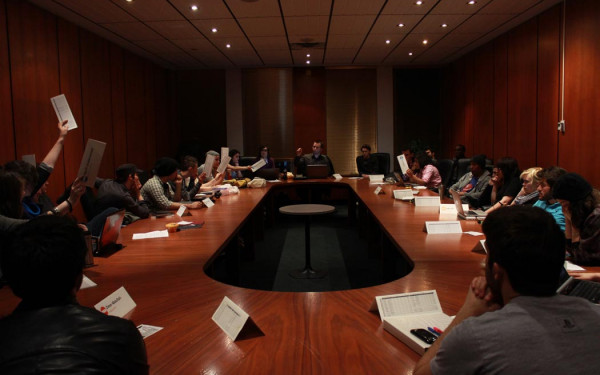CSU SGM Fails to Meet Quorum
The latest Concordia Student Union Special General Meeting was a forum with no quorum on a frigid Reggie’s terrace March 26.
The meeting’s agenda included votes on CSU participation in the minimum agreement between Quebec student organizations, as well as deciding whether to renew the undergraduate strike, which had ended on March 23, until March 30.
Neither of those decisions were made, however, as total voter turnout was only approximately 348 students. Quorum to begin an SGM and vote on binding resolutions is 450 students.
“It was a tough call,” said CSU Chair Nick Cuillerier, who was also one of the chairs at the first GA. “After waiting 45 minutes to an hour, it appeared that the amount of people coming in and registering was not equal to the amount of people that were leaving the premises. I waited as long as I reasonably could. […] There were a lot of people waiting in the cold, and I had to make the decision.”
The SGM was called after a petition signed by 294 students was submitted to the CSU.
Part of the purpose of the SGM was to discuss the minimum agreement, which is a contract that binds student group signatories to three clauses.
The provisions bar signatories from speaking out against the actions of other groups; call for the refusal to negotiate with the government if any student group is excluded, and prevent umbrella groups from taking a side with the government position on the hikes.
While three national student groups in Quebec signed the minimum agreement, it has not been signed by the the Fédération étudiante universitaire du Québec, which is the group that the CSU belongs to.
The motion also stipulated that weekly General Assemblies be held by the CSU to decide on continuation of the strike, while respecting and supporting individual faculty association GA decisions.
The SGM was originally slated for March 23 but was pushed back due to the province-wide rally that saw Montreal streets flooded with some 200,000 students.
“We didn’t have the adequate amount of time to advertise [the SGM] given March 22 and then [there was] the university’s email on Friday and everything leading up to that,” said CSU VP External Chad Walcott, referring to an email sent to students by Concordia administration.
The email denounced strike actions and threatened legal action for those who attempt to block entry to buildings and classrooms.
“There is going to be another petition signed soon,” Walcott said, “so we’ll just have to try again and hopefully find out when it is earlier.”
When the meeting was adjourned, the microphone passed from CSU to student hands, with calls for immediate action.
The biting wind forced students to regroup on the seventh floor of the Hall Building where CSU VP Advocacy Morgan Pudwell facilitated an informal discussion on further action against the hike.
Initiatives ranging from blocking buildings and exam rooms, economic blockades, creative protests and action outside of Premier Jean Charest’s office were brought to the agenda.
Some students were vocal about loss of momentum in the student movement due to mounting separation, misinformation and fear; there were various calls to “stop talking and do something.”
Geography students three floors below were taking action by forming a picket line outside of a GEOG 318 class. Those holding the line would not provide their names in light of the firm stance taken by the university. They said that they were letting students into the classroom, but not professors.
This action facilitated the low attendance that lead to the cancellation of class by lecturer Julie Podmore, after consultation with the Concordia security guards who faced protesters.
“A lot of faculty feel like they’re out of ideas because the university has said they are not extending the semester,” said Podmore.
The need for discussion between students and professors is essential, she said, as many professors are unsure which students are actually involved with strike action.
Following group discussion on the seventh floor, students broke into smaller groups for dialogue.
The conversation addressed three main concerns: alternative Concordia actions such as picketing classrooms and buildings, ways to participate in a broader week of economic action with other student groups like L’Association pour une solidarité syndicale étudiante and networking with contacts that could aid the movement.
While CSU President Lex Gill admitted that executives were “burning out,” it seems that other student leaders are beginning to mobilize.

_900_598_90.jpg)




2_600_375_90_s_c1.jpg)
.WEB_600_375_90_s_c1.jpg)